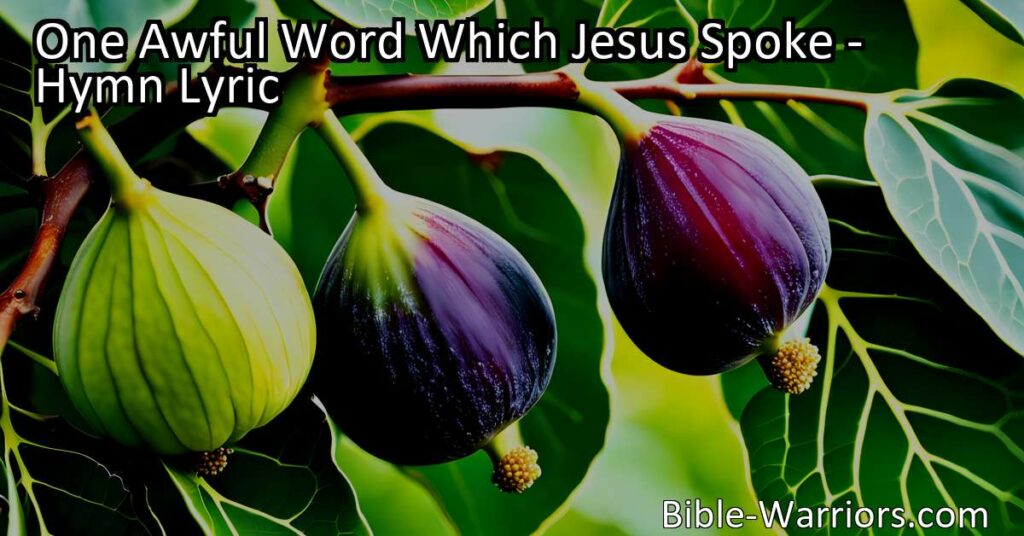One Awful Word Which Jesus Spoke – Hymn Lyric
“One Awful Word Which Jesus Spoke” is a beautiful hymn that teaches us the importance of bearing fruit in our lives. Through the metaphor of a barren fig tree, Jesus warns us not to be deceived by appearances and to live out our faith in a meaningful way. By combining knowledge, zeal, and gifts with genuine faith and love, we can become fruitful disciples of Christ, shining His light in the world.
Table of Contents
One Awful Word Which Jesus Spoke – Hymn Lyric
One awful word, which Jesus spoke,
Against the tree which bore no fruit,
More piercing than the light’ning’s stroke,
Blasted and dried it to the root.
But could a tree the Lord offend,
To make him shew his anger thus?
He surely had a farther end,
To be a warning-word to us.
The fig-tree by its leaves was known,
But having not a fig to show;
It brought a heavy sentence down,
“Let none hereafter on thee grow.”
Too many, who the gospel hear,
Whom Satan blinds and sin deceives,
We to this fig-tree may compare,
They yield no fruit, but only leaves.
Knowledge and zeal, and gifts and talk,
Unless combin’d with faith and love,
And witness’d by a gospel walk,
Will not a true profession prove.
Without the fruit the Lord expects,
Knowledge will make our state the worse;
The barren tree he still rejects,
And soon will blast them with his curse.
O Lord, unite our hearts in pray’r,
On each of us thy spirit send,
That we the fruits of grace may bear,
And find acceptance in the end.
Meaning of One Awful Word Which Jesus Spoke
In the beautiful hymn titled “One Awful Word Which Jesus Spoke,” we are reminded of a powerful message that Jesus shared with His disciples. Through the metaphor of a barren fig tree, Jesus teaches us a valuable lesson about the importance of bearing fruit in our lives.
Imagine a magnificent tree, standing tall and proud, with its branches reaching towards the sky. This tree had lush green leaves, giving the impression of vitality and growth. However, upon closer inspection, it became evident that this tree was lacking something significant it bore no fruit.
Jesus, in His infinite wisdom, used this sight to impart a profound message to His followers. He spoke a word so powerful that it had the same impact as a lightning strike. This one word caused the tree to wither and dry up, bringing an end to its existence. But why would Jesus, who is known for His love and compassion, display such anger towards a tree?
The truth is, Jesus had a greater purpose in mind. His actions served as a warning for all of us. The fig tree, with its deceptive appearance, serves as a symbol for those who may appear to be followers of Christ but lack the essential quality of bearing fruit. Just as the tree brought forth leaves but failed to produce figs, there are many individuals who claim to know God but do not live out their faith in a meaningful way.
We can compare these people to the fig tree because they may possess knowledge, enthusiasm, and eloquence in their speech, but these qualities hold no true value if they are not accompanied by genuine faith and love. In fact, having these traits without a transformed heart can actually make their spiritual state worse.
Jesus makes it clear that He expects His followers to bear fruit. But what does it mean to bear fruit? It encompasses more than just observing religious practices or reciting well-rehearsed prayers. Bearing fruit requires living out God’s commandments and reflecting His love in our words and actions.
Imagine a fruitful tree, abundant with luscious fruit hanging from its branches. This tree is not only visually appealing but also fulfills its purpose by providing sustenance and nourishment to others. Similarly, when we bear fruit, we become a source of blessings and encouragement to those around us.
Bearing fruit involves combining our knowledge and zeal with faith and love. It means walking in accordance with the teachings of the gospel. Our actions should align with our words, and our lives should exemplify the values and principles Jesus taught us.
However, if we withhold the fruit that the Lord expects from us, we risk facing His rejection. The barren tree in the hymn exemplifies those who claim to follow Christ but fail to produce meaningful results in their lives. The Lord does not desire empty professions of faith; He desires transformed hearts that bear fruit for His glory.
Let us reflect on our own lives. Are we like the fig tree, adorned with leaves but lacking fruit? Or are we actively bearing fruit and making a positive impact on the lives of others? It is not enough to simply hear the message of the gospel; we must internalize it and allow it to transform us from within.
As we unite our hearts in prayer and invite the Holy Spirit into our lives, we can be empowered to bear the fruits of grace. The Spirit works within us, cultivating qualities such as love, joy, peace, patience, kindness, goodness, faithfulness, gentleness, and self-control all of which are essential for a fruitful life.
By bearing fruit, we find acceptance in the end. We find fulfillment and purpose as we live out God’s plan for our lives. Our lives become a testimony to His transformative power, a living representation of His love and grace.
So, let us heed the warning in this beautiful hymn. Let us not be content with simply displaying leaves, but let us strive to bear fruit that glorifies our Heavenly Father. May our knowledge, zeal, gifts, and talk be combined with genuine faith and love, so that our lives may be a true reflection of our profession of faith.
In doing so, we can be assured of finding acceptance in the end a reward far greater than anything this world can offer. Let us commit ourselves to be fruitful disciples of Christ, shining brightly for Him in a world that desperately needs His love and grace.
May this hymn and its powerful message resonate within our hearts, inspiring us to live lives that bear fruit and bring honor to our Lord and Savior, Jesus Christ.
I hope this hymn inspired image brings you hope and peace. Share it with someone who needs it today!



